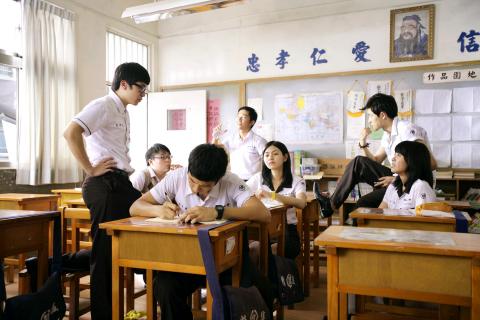Puppy love, hormones and masturbation are what being a teenager is all about, so it’s not surprising they play prominently in best-selling writer Jiubadao’s (九把刀 or “Nine Knives”) feature debut about his adolescent years.
You Are the Apple of My Eye (那些年,我們ㄧ起追的女孩) is based on a real-life romance that took place back when the novelist was still known by his real name, Giddens Ko (柯景騰). The highly anticipated movie is guaranteed to be a hit with Jiubadao’s readers and others who have an appetite for a bit of juvenile fun.
Newbie actor Ko Chen-tung (柯震東) plays Ko-teng, a teenage boy whose life revolves around hanging out with school buddies and goofing off. But there is one thing Ko-teng does not understand about his mates: They all have a crush on Shen Chia-yi (Michelle Chen, 陳妍希), an honor student in their class.

Photo Courtesy of Sony Music Entertainment Taiwan
When the teacher asks Shen to keep an eye on the prank-loving boy, he falls for her too. The pair are drawn to each other, and yet Ko-teng, afraid of being rejected, cannot bring himself to ask Shen to be his girlfriend.
Their love continues after the two go to different colleges until one night, a big fight puts an end to their youthful romance. Several years later, Ko-teng, now a writer, and his high school mates watch Shen walking down the aisle with another man, appearing as beautiful as they remember.
With a well-selected cast and a brisk pace, Jiubadao’s polished freshman effort manages to keep up a high level of energy throughout, frequently brandishing boyish humor that often involves a fixation with the male sex organ. One amusing example is a fantasy sequence in which the boys masturbate in a dance number while a teacher shows off some sexy moves in front of the class.
Although the penis jokes can get a bit tiring after a while, the director deserves a special mention for capturing adolescent urges with a fun, manga-esque punch.
The puppy love story would be less convincing if not for the two leading actors, who convey youthful innocence with what appears to be little effort. Jiubadao’s on-screen alter-ego Ko Chen-tung arrests attention with his charisma, and the up-and-coming Chen emerges from her supporting role in the romantic comedy Hear Me (聽說, 2009) as another one to watch.
The movie is at its best when it reminds viewers of their own lost youths. The 33-year-old director has repeatedly said it is like a time machine that takes him back to the past, and insisted on shooting the film at his old high school in Changhua.
One’s adolescence is a rich source of inspiration to many filmmakers. Think Tom Lin Shu-yu (林書宇) and his autobiographic debut feature Winds of September (九降風, 2008) and Lin Yu-hsien’s (林育賢) Jump Ashin! (翻滾吧!阿信), which is currently showing in theaters. You Are the Apple has potential but lacks the much-needed association of the personal with the collective that makes the other works shine.
Still, the film could be another feather in the cap for Jiubadao, as it appears the author has created a summer blockbuster. Since its soft opening on Friday last week, both the Liberty Times (the Taipei Times’ sister newspaper) and the Apple Daily have reported that the film has pulled in more than NT$20 million, making it the first Taiwanese film to do so before its official opening today.

Taiwan has next to no political engagement in Myanmar, either with the ruling military junta nor the dozens of armed groups who’ve in the last five years taken over around two-thirds of the nation’s territory in a sprawling, patchwork civil war. But early last month, the leader of one relatively minor Burmese revolutionary faction, General Nerdah Bomya, who is also an alleged war criminal, made a low key visit to Taipei, where he met with a member of President William Lai’s (賴清德) staff, a retired Taiwanese military official and several academics. “I feel like Taiwan is a good example of

March 2 to March 8 Gunfire rang out along the shore of the frontline island of Lieyu (烈嶼) on a foggy afternoon on March 7, 1987. By the time it was over, about 20 unarmed Vietnamese refugees — men, women, elderly and children — were dead. They were hastily buried, followed by decades of silence. Months later, opposition politicians and journalists tried to uncover what had happened, but conflicting accounts only deepened the confusion. One version suggested that government troops had mistakenly killed their own operatives attempting to return home from Vietnam. The military maintained that the

Before the last section of the round-the-island railway was electrified, one old blue train still chugged back and forth between Pingtung County’s Fangliao (枋寮) and Taitung (台東) stations once a day. It was so slow, was so hot (it had no air conditioning) and covered such a short distance, that the low fare still failed to attract many riders. This relic of the past was finally retired when the South Link Line was fully electrified on Dec. 23, 2020. A wave of nostalgia surrounded the termination of the Ordinary Train service, as these train carriages had been in use for decades

Lori Sepich smoked for years and sometimes skipped taking her blood pressure medicine. But she never thought she’d have a heart attack. The possibility “just wasn’t registering with me,” said the 64-year-old from Memphis, Tennessee, who suffered two of them 13 years apart. She’s far from alone. More than 60 million women in the US live with cardiovascular disease, which includes heart disease as well as stroke, heart failure and atrial fibrillation. And despite the myth that heart attacks mostly strike men, women are vulnerable too. Overall in the US, 1 in 5 women dies of cardiovascular disease each year, 37,000 of them